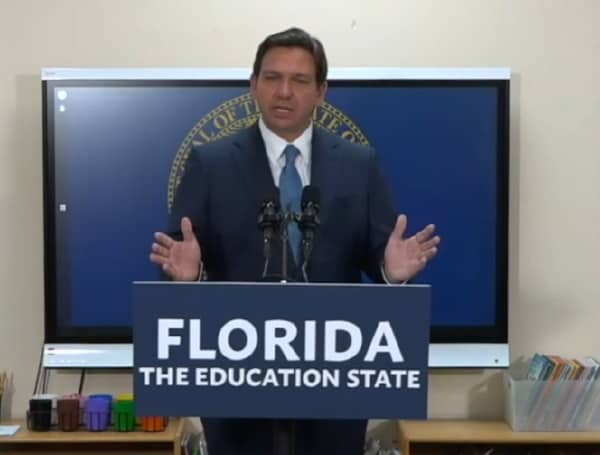The education landscape in Florida has undergone a significant transformation, driven by the aggressive school choice initiatives championed by Governor Ron DeSantis and the Republican-led state government.
As a result, the state has witnessed a surge in private and charter school enrollments, leading to a concerning decline in traditional public school attendance and the looming prospect of campus closures across several of Florida’s largest school districts.
In March 2023, DeSantis signed a groundbreaking bill that further promoted school choice by eliminating restrictions based on financial eligibility and abolishing enrollment caps.
Read: Under Florida Gov. DeSantis’ Plan, Sunshine Skyway Will Turn Red, White And Blue
This move has empowered more parents to explore and access a diverse range of educational options, including private schools, charter schools, and homeschooling.
The impact of these school choice initiatives has been swift and profound. Private school enrollment in Florida has seen a remarkable increase, with nearly 29,000 additional students enrolling from pre-kindergarten to 12th grade in 2023 compared to the previous year.
Furthermore, over the past decade, more than 600 new private schools have been established in the state, leading to approximately 120,000 students opting for private education over public.
As a direct consequence of the surging popularity of alternative educational pathways, Florida’s traditional public schools are facing a significant decline in enrollment. This trend is particularly evident in some of the state’s largest school districts, where administrators are now grappling with the prospect of campus closures.
Duval County Public School District, the sixth-largest school district in Florida and the 20th-largest in the country is among the districts considering campus closures due to a dramatic drop in enrollment numbers. The exodus of students from the district’s public schools has put significant financial strain on the system, forcing administrators to explore cost-cutting measures.
Read: Florida Gov. DeSantis Among Republican Governors Defying WHO On Pandemic Treaty
Broward County Public Schools, Florida’s second-largest school district, has also evaluated plans to close up to 42 campuses over the next few years. The district is facing a similar challenge of dwindling enrollment as parents increasingly opt for private or charter school options.
The trend of declining public school enrollment is not limited to Duval and Broward counties; Miami-Dade county, the state’s most populous region, has also experienced a substantial decline in the number of students attending traditional public schools.
The growing popularity of school choice in Florida can be attributed to a multitude of factors, each contributing to the erosion of public school enrollment.
Florida’s public schools have faced criticism for their perceived emphasis on contentious social topics, such as critical race theory, and for implementing policies that have been viewed as controversial by some segments of the population. This backlash has fueled the desire of many parents to seek alternative educational options for their children.
The shift towards more conservative majorities on school boards in several Florida counties, including Miami-Dade, Sarasota, Duval, Martin, and Clay, has also played a role in shaping the education landscape. These changes have further reinforced the push for school choice and the move away from traditional public schools.
Read: Suspended State Attorney Worrell Lawsuit, Challenging Florida Gov. DeSantis, Tossed
Financial Strain on Public Schools
As students continue to leave traditional public schools in favor of private or charter options, the resulting decline in enrollment has led to significant financial challenges for the affected districts.
This has forced administrators to explore cost-cutting measures, including the possibility of campus closures.
The emphasis on school choice has raised concerns about the potential for uneven access and equity in the education system. While affluent families may have the resources to exercise their choice, lower-income families may face barriers in accessing the same educational opportunities.
The closure of public schools, which often serve as hubs for local communities, can have a detrimental impact on community cohesion and the sense of shared identity. This can lead to disruptions in the social fabric and the loss of important community resources.
Florida’s education policies, spearheaded by Governor DeSantis, have transformed the state’s educational landscape and served as a model for other GOP-leaning states seeking to emulate similar reforms.
Read: Florida Governor DeSantis Appoints Two To The Greater Orlando Aviation Authority
DeSantis has been vocal about his desire to see the policies implemented in Florida replicated across the country, positioning the state as a “blueprint” for conservative education reforms. This has the potential to shape the national discourse on education policy and the role of government in shaping the education system.
As other states look to Florida for inspiration, the “Florida model” of school choice and the aggressive promotion of alternative educational pathways is poised to gain traction in various regions of the United States.
This could lead to a broader shift in the national education landscape, with potentially far-reaching implications for the future of public education.
Help support the Tampa Free Press by making any small donation by clicking here.
Android Users, Click To Download The Tampa Free Press App And Never Miss A Story. Follow Us On Facebook and Twitter. Sign up for our free newsletter.

